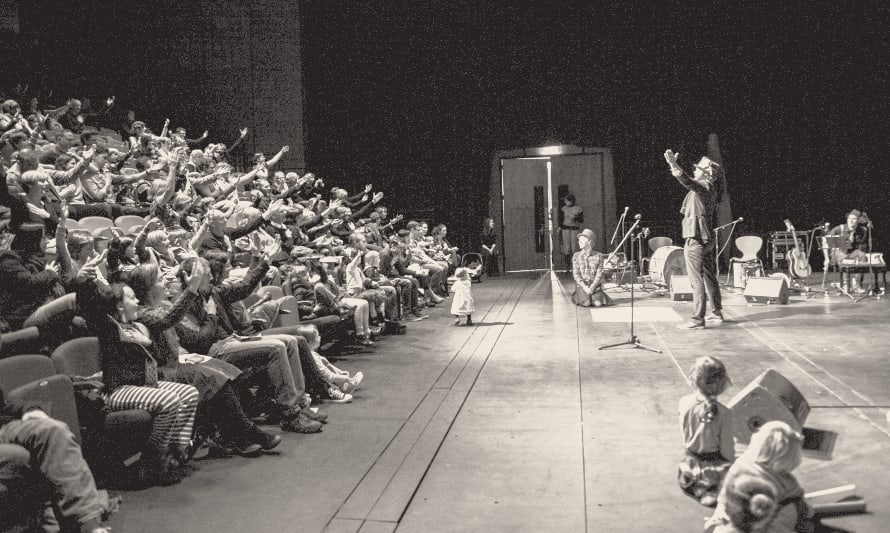
Electric Sheep: First Day at Flatpack
Well, Flatpack has arrived! And, after a snaking rail journey through the Midlands countryside, so have I. Leaving Moor Street Station with my suitcase in hand, I headed towards my festival digs – a beautiful National Trust property known as Back to Backs. Set in an old terrace of workers’ cottages bang in the middle of the city centre, my 1930s cottage acts as a time capsule to another world of Clarice Cliff tea-sets and ‘Home Sweet Home’ embroideries. A perfect setting for Flatpack’s first day of events, which took a nostalgic look at early cinema.
Just as I was about to settle down to a life of pre-war domesticity, I was off again – to Floodgate Kino, Flatpack’s head quarters. Nestled amongst fading industrial factories, the Kino was a hive of activity, with volunteers putting the finishing touches to the building. Magnificent wooden cogs explode from the walls, bringing the graphics of the Flatpack programme to life. The designers have done a brilliant job - I can’t wait to see the place alive with people!
After a quick catch up with Pip, the Festival Director, I took to the streets to follow Flatpack’s specially-commissioned art installation trail. Cunningly nestled in shop windows throughout the city, a collection of works explore the techniques of early cinema. I was especially fond of Anne Guest’s re-working of Psycho. Playing with the idea of inter-titles in silent film, Guest has re-fashioned the script into SMS speak (‘OMG! BLUD! MUM! – Norman’) to very funny effect. The installation trail proved a great way to explore the city and also meet other festival-goers as our paths crossed. Definitely worth a look!
Later on, I headed to the drinks reception for some wine and festival mingling before the first big Flatpack event – Curzonara. Set in the grandeur of Birmingham’s Town Hall, there was a real sense of occasion as the audience filtered in and the 15-piece band took to the stage. Compeered by Mr Paul Murphy, the event told the rise and fall of Waller Jeffs, patron saint of the festival and pioneer of early cinema in the city. Jeffs put on seasons of animated pictures around Birmingham between 1901 and 1912. In 1909, with the opening of the Electric Cinema on Station Street (amazingly the cinema remains up-and-running and is, in fact, a Flatpack Festival venue!), Jeffs fell into relative obscurity, running a cinema in Stratford-Upon-Avon.
The cleverly put-together programme was one of the best I’ve seen on early cinema – rather than a straight-forward screening with live musical accompaniment, the event really captured the drama and excitement of a turn-of-the-century screening. The musical interludes and intermission created a theatrical spectacle not often incorporated into cinema. As the sonorous voice of the compeer asked to ‘dim the lights’, there was a genuine hush of excitement before the screen exploded with images of the Hudson River in 1899. The expanse and scale of the river suggested a world of possibilities and occasional flashes of steam boats and trains hinted at the radical shifts of technology taking place at this time. It was certainly an exhilarating opening. Over the next two hours, the treats continued with Victorian footage of Birmingham (especially nice after a day of exploring the city!) and classic works of the era – Melies’ Trip to the Moon and Porter’s The Great Train Robbery – which showed the quick development of narrative in film.
As well as lots of fun, the evening also had a more poignant side as we watched factory workers leaving the Kynoch works in 1901. As young boys waved and fooled around in front of the camera, Mr Murphy reminded us that many of these young men would be killed in the Great War. As he spoke of the workers ‘unknowingly staring into our eyes – their digital descendents’, I felt a shiver down my spine. As cinema is a relatively new medium, there is always a sense of film capturing the present, the here-and-now, the living. It was a shock to think that these boys leaving the factory were a long-gone generation, captured so fleetingly. The programme really made you think about how film presents the past to modern audiences. Waller Jeffs would often show footage such as this to local audiences the day after filming so that those filmed could see themselves moving on the big screen - maybe a century from now, our ‘digital descendents’ will be looking at us on youtube and facebook in the same way.
It was an incredible evening and there was a real buzz in the auditorium – everyone was clapping along and laughing. Heading back to my worker’s cottage, I was left thinking about the factory workers at Kynoch and also exhilarated by a blistering opening night. Looking forward to what the rest of the festival has to bring!